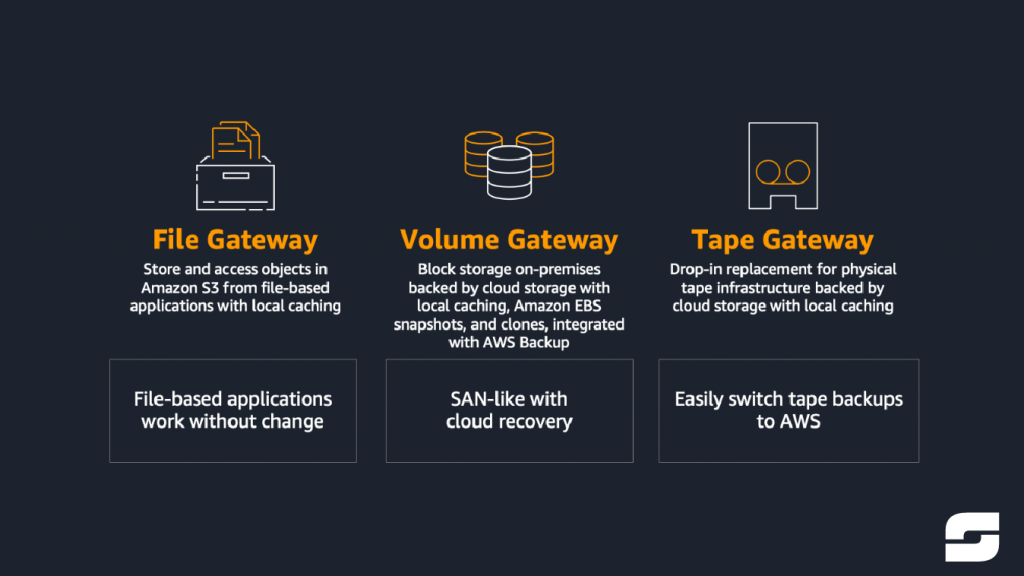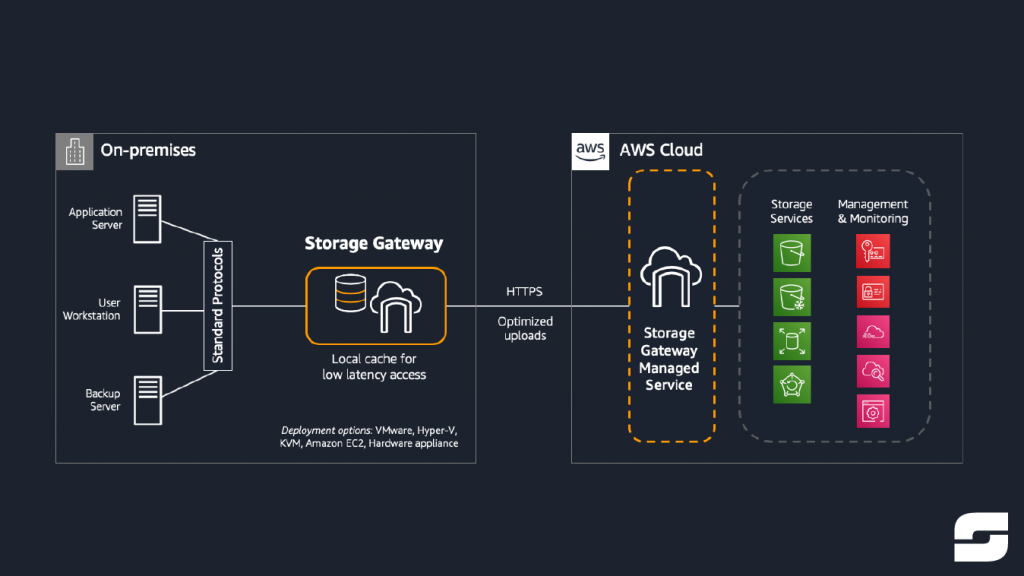AWS Storage Gateway is a cloud storage gateway that connects an on-premises software appliance with cloud-based storage to provide seamless and secure integration between an organisation’s data and the AWS storage infrastructure.
The Storage Gateway appliance is deployed as a virtual machine (VM) on a host in the customer’s data centre. The appliance connects to the customer’s local network and presents itself as an iSCSI target. This gives the customers on-premises applications the ability to use Amazon S3, EBS, or Glacier as primary storage, while providing low-latency access to their frequently accessed data.

The Storage Gateway virtual appliance supports two types of gateways:
File Gateway
File Gateway – Provides an SMB interface for applications using file storage. Files are stored as objects in Amazon S3, with full metadata and tag support.
File Gateway allows you to access files stored on your computer from anywhere in the world. It’s like having a private cloud storage system that you can access from any device with an internet connection. The File Gateway is perfect for small businesses or individuals who need to share files with others but don’t want to use a public cloud service like Dropbox or Google Drive.
Whose is it for?
The File Gateway is also great for photographers who need to store and share large files (like RAW files) with clients or collaborators. The File Gateway has a simple, easy-to-use interface and is backed by Amazon’s world-class security and reliability.
Volume Gateway
Volume Gateway – Provides iSCSI block storage presenting volumes that can be attached as devices to Windows or Linux EC2 instances. Volumes are stored as EBS snapshots, providing durable, off-site backup.
Volume Gateway allows you to use your on-premises storage infrastructure with AWS. The gateway maintains compatibility with most storage applications, making it easy to get started with using AWS storage. In addition, the gateway can be used to connect multiple on-premises storage arrays to AWS, providing you with flexibility and scalability.
Whose is it for?
Storage Gateway is an ideal solution for organisations looking to take advantage of the benefits of cloud storage without sacrificing performance or security.
The Storage Gateway service is a fully managed service that handles all of the gateway’s software updates and maintenance tasks automatically. This means that customers can focus on their applications and leave the management of their storage gateway to AWS.

AWS Storage Gateway provides customers with a number of benefits:
Seamless Integration – The Storage Gateway virtual appliance integrates seamlessly with customer’s on-premises applications and allows them to use Amazon S3, EBS, or Glacier as primary storage.
Flexible Storage – The File Gateway and Volume Gateway offer customers flexibility in the way they store their data. File Gateway stores files as objects in Amazon S3, while Volume Gateway stores volumes as EBS snapshots. This gives customers the ability to choose the storage option that best suits their needs.
Security and Compliance – The Storage Gateway uses SSL to encrypt all data in transit and supports IAM for granular control over who has access to what data. In addition, the File Gateway integrates with AWS CloudTrail to provide customers with auditable logs of all file operations.
High Availability and Durability – The Storage Gateway is designed for high availability and durability. Data stored in Amazon S3 is replicated across multiple Availability Zones, ensuring that it is always available in the event of an outage. In addition, the Storage Gateway appliance can be deployed in a cluster for added resiliency.
Scalability – The Storage Gateway scales automatically to accommodate changes in customer demand. There is no need to provision additional storage capacity ahead of time.
Low Cost – The Storage Gateway provides a cost-effective solution for storing data on-premises. There are no upfront costs and customers only pay for the storage they use. In addition, the File Gateway offers customers the ability to transition their data to Amazon S3 gradually, allowing them to take advantage of the cost savings that Amazon S3 offers.
Conclusion
AWS Storage Gateway is a powerful tool that can help you manage your storage needs in the cloud. It provides a number of features that make it easy to store and retrieve data, and it is also highly scalable. However, there are some drawbacks to using Storage Gateway, such as the fact that it is not compatible with all Amazon services. Overall, though, Storage Gateway is a useful tool that can help you get the most out of your cloud storage.

